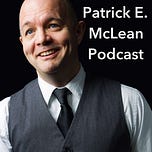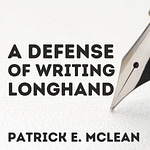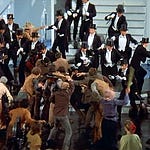The closest I can come to a definition of humility is something like ‘the proper understanding of your relationship to the Cosmos.’
This is a tall order because the Cosmos is vast none of us know very much about any part of it.
That’s not false humility, that’s just a fact. The world we see is very complicated. Hideously complicated, in fact, and I think we have developed cultural and psychological mechanisms to hide this fact from ourselves so that we don’t go insane. We view things in the lowest level of resolution that will allow us to operate them to get what we want.
And you know this because, every once in a while, that thing you thought you understood, stops working and blows up into a snarl of unexpected complexity. But it’s not that it blows, up, really. The complexity was there all along. You just didn’t notice because it wasn’t causing you any problems.
It’s like this when your car fails to pass inspection because the check engine light is on. It’s a pretty simple matter, you just need to get the little light turned off. But behind that light lurks mechanical problems, finding and negotiating with a mechanic, proprietary auto parts, distribution networks, emissions and motor vehicle regulations, and all the other problems that come with not having a car while it’s being fixed. Maybe your marriage isn’t in a great place and asking for a ride to the mechanic’s is the thing that precipitates the fight that lands you in divorce court.
Now the check engine light hasn’t just revealed a problem with your car, but a problem with your life. And yet all that complexity was seemingly hidden from you by a dashboard lights.
Compared to the complexity of the world, you’re not that smart, you don’t live that long, and, when you look at yourself in a global fashion, almost no one knows or cares who you are. You are insignificant.
Except that you’re not. NOT AT ALL. You are the most important thing in the world, in fact, you are the world, as far as you’re concerned – and certainly of utmost importance to your family and those who love you. The business of living is only frivolous when viewed from the outside.
Objectively, you’re a worm. Subjectively, you are the center of the universe. And for me, having humility means that you can reconcile this paradox in a more or less graceful fashion.
It’s knowing that I cannot fly under my own power but if I struggle to make something of my life, maybe, just maybe I could invent a plane. Or I could uncover some bit of knowledge that would enable someone to invent a plane.
When Richard Feynman got a letter from a student in which the student disparaged his work and complained of being a ‘nameless man’ Feynman, responded with a letter that included this:
No problem is too small or too trivial if we can really do something about it.
You say you are a nameless man. You are not to your wife and to your child. You will not long remain so to your immediate colleagues if you can answer their simple questions when they come into your office. You are not nameless to me. Do not remain nameless to yourself – it is too sad a way to be. Know your place in the world and evaluate yourself fairly, not in terms of your naïve ideals of your own youth, nor in terms of what you erroneously imagine your teacher’s ideals are.
Of course, the problems you can do something about do not have to be technical problems. And, in some sense, I think the problems of the hard sciences are easy. You can know when they have been solved. And the people working on them usually know when progress has been made.
Moral problems – the problems that exist between people are more complicated than quantum theory. This is true technically. Our relatively stable societies, rest on millennia of evolution and trial and error. The smartest people doing the best they could to figure out how we could best live together and co-operate to make progress towards shared goals.
No one person can create the richness of language. The labor is massive. No one person can create the common law. These things have taken generations. We are all worms – except that we’re not.
Because we can choose to make a small dent.
To say that Einstein and Newton were brilliant and you are not – to throw your hands up in despair, saying “what can I possibly do,”" is a lack of proper humility.
Genius is a fact. Stupendously brilliant people come along every once in a while. And they make bigger leaps than the rest of us. But how smart are they compared to the complexity of the world, and how much are those leaps within their control?
Because here’s the thing, if you’re a genius in the sciences, you not only have to be brilliant, but you also have to be born at the right time – there has to be a fundamental problem left unsolved, and it has to be ripe for the solving. The groundwork, mathematically, observationally, experimentally has to have been done so that you can solve the problem.
Galileo wasn’t the first person to argue that the Earth wasn’t the center of the universe. He was the first person to PROVE it. That’s why, among other things, he’s known as the father of Observational Astronomy. But without the telescope – invented by a Dutchman, he wouldn’t have gotten there. And the invention of the telescope wouldn’t have been possible without Nicolas of Cusa inventing eyeglasses in 1421 AND THEN nearly 200 years of craftsmanship and improvement in the art of lens making.
Properly understood – all of those people helped to solve that problem.
I think that, if you look at it correctly, you see that when compared to the total complexity of the world, geniuses are effectively just morons just like you and me.
Consider it from God’s perspective. Imagine that you are all-knowing, and you look down upon humanity and consider three people. A polymathic genius, like Newton, me, and someone with a sub 80 IQ. Say Down’s syndrome. And while I’m busy secretly holding the person with Down’s syndrome in contempt because I’m so much smarter than that poor bastard, the genius is thinking the same thing about me. The three of us, all perfectly stacked in a foolish hierarchy of arrogance.
Because how to does it appear to an omnipotent being with infinite IQ? Or let’s say a mere million IQ – Our polymath has an IQ of, say, 200. There’s a very smart person’s’ worth of intelligence – 120 IQ points between the polymath and the person with Down’s Syndrome.
But from a million IQ perspective, that’s .012% difference. If God wasn’t omnipotent, he wouldn’t even be able to notice the difference. From a higher perspective, we’re all morons.
I’ve seen a lot of these foolish hierarchies of arrogance. Authors can be very bad about this. There’s an imaginary pecking order in Sci-Fi and Fantasy Authors – and perhaps literary authors as well. And I’ve seen many of the people in these hierarchies that are so terrifically ego-compromised that their lives are hell. Every little thing bridles them. They expend a tremendous amount of energy on status signaling and petty feuds.
When, from a higher view, they all suck anyway. Statistically speaking, none of these jackasses are going to be read after they are dead. I don’t certainly don’t exempt myself from this, almost no one reads me now. But, perhaps, because I’ve cultivated a bit of humility, I can face this distressing fact and not run screaming from it.
Well, some days at least.
BUT IT GETS WORSE. Consider that things like IQ and “talent” aren’t enough – for anything. I mean, you don’t want to leave home without them if you can avoid it. But geniuses or even mere experts, are astoundingly ignorant outside their domain of expertise.
And without hard work – we might call that the virtue of industry? – nothing happens.
Thinking this way, is, I think, a key part of humility – and not just because intelligence is utterly unrelated to a person’s moral worth, but because it’s incredibly useful.
Because humility makes you more effective. It helps you work harder. When you really understand the true stakes and your place in reality, you can better operate reality. A correct map allows you to travel faster and get where you want to go.
Think of the Tortoise and the Hare. The race was lost because of a lack of humility. The Hare didn’t take the job seriously.
But that’s not all. Humility gives you the real freedom not to care what other people think about you. Not only are you largely inconsequential. So are they. What a weight that would have been lifted from my younger self.
Pelin Kesebir, a researcher at the University of Wisconsin-Madison:
“Humble people are able to tolerate an honest look at themselves, and non-defensively accept their weaknesses alongside their strengths,” she says. “This untroubled, serene, secure relationship to oneself diminishes the need to constantly monitor and defend one’s self-worth, bringing about freedom from a never-ending and exhausting tendency to compare oneself to others.”
It is the serene state of zen modeled by Chevy Chase’s character in Caddyshack. When the Judge asks him “You don’t keep score? How do you compare yourself against other golfers?” He looks down on him and answers, “By height?”
This joke, like all good jokes, is funny on a very deep level. Because the Judge, the character asking the question, is pretentious and arrogant. A monstrous creature that, if the movie wasn’t a comedy and Ted Knight wasn’t such a great actor, we would hate very quickly. It might not be enough for him to be defeated in a golf match at the end of the story. Played seriously, he’d be such a terrible monster, we might have to see him die to have the movie resolve satisfactorily. He has no humility.
And what that joke means is, “It doesn’t matter how good you are at any particular, skill, what a person like you thinks of a person like me, doesn’t matter. You’re focused on things that aren’t important because your ego is out of control.”
Thank God for comedy, because if you’re in that situation for real and instead of making a joke, you say something like how I tried to unpack that, you’ve probably got a fight on your hands.
I think humility is the most important virtue to cultivate. It’s the one that keeps your ego in check and keeps you from becoming a monster that is destructive to yourself and all those around you. But that’s not why I think it’s the most important virtue.
“Humble people are able to tolerate an honest look at themselves.”
An honest look at yourself is a terrible thing. You need a real strength of character to withstand it. But all growth and improvement rests on an honest assessment of who you are and where you are at. If a person doesn’t have that, they become lost. Unable to correctly orient themselves in the world so that they can make real progress in any dimension that you’d care to pick. Moral, spiritual, financial.
I’ve spent much of my life being lost in exactly this way.
If you want to be a great investor, you can’t be blind to your failures. You have to look at your failures in painful details. You can’t have the good feeling of thinking yourself a genius, or the odds just went against you that time. You have to steep in the suck so the painful corrective mechanism of reality can teach you to be better.
Or guitar. The single best piece of advice I’ve gotten about getting better at playing guitar is “Don’t practice what you already know.” Yet that’s what most people spend their time doing. They work on the stuff they already know partially because it helps them to feel good about themselves. The ego says, “Look at me, I’m great!”
But if you’re really serious about getting better at something, you need to take your ego out back and beat it with a club.
Consider something as simple as a pushup. If you watch most people do pushups, you will see that they use speed to skip past the place where they are weakest. It’s usually about half-way down. They will drop past it on the way down, and explode past it on the way up – effectively never working the weakest link of that muscular chain.
This is a failure of humility. People who exercise want to be strong or look good or maybe both. But they also want to feel good about themselves. To feel strong. But feeling strong is the enemy of becoming stronger.
Try this, set a :60 timer and, for lack of a better term, push down for :30 and push up for :30. You will not feel strong.
In fact, if you stop in that place where you are weakest, it will be terrible for your ego. You should totally try this. If you’re not comfortable with a full pushup use your knees or lean against a table or wall. But go slow and find that spot where you are weakest.
That’s the spot where strength is created. You’ve got to have the humility to go to your weakest spot or worst exercise and work on that. This humility is incredibly practical.
It helps not to feel sorry for yourself. And it also helps to admit that it’s not a pleasant experience. When I was first introduced to this principle, I said, right out loud, “God, this terrible” and it somehow got easier.
In my experience, what’s true of pushups is also true of character. Without humility, it is very hard to see where you are lacking. And so, humility makes it easier to learn everything else.
You have to know that you’re not very good, but also know that you are good enough to do something about it. And here humility bleeds over into hope. All these lines are messy.
You have to know that you can’t fly, and when you jump, the landing might hurt. But you also have to know AT THE SAME time that when you jump, it moves the whole Earth. Sure, it’s just an infinitesimal amount, but it’s the whole damn Earth. And when you move, the atoms are you affect every other atom in the universe. That’s not even quantum weirdness, that’s just the way gravity works. Sure, it’s not much an effect, but it IS.
And what it feels like is, when you leap, the planet itself has no choice but to rise to meet you.
Calibrating your understanding of the fact that you don’t really matter but that your actions are very important seems central to humility to me. Which, for me, makes the tool of humility an infinitely long ruler. One that you can use to precisely measure yourself against the world. And one that, if you want to be a better person in any sense, you should use all the time.
But it’s tricky. Because if you become proud of being humble, you blow it. If you win a medal for humility, you can never wear it.
And it seems like humility can make you happier. True gratitude certainly relies on it. And when are you happier when there are tears of gratitude in your eyes? Those moments when you realize how lucky you are to have whatever it is that you have?
As an artist, humility is also useful, because it allows you to learn from everything. Even the things that you hate. I stopped hating things in my 30’s. That song or book or movie that you hate that everybody loves? There’s a reason that everybody loves it. And it behooves you to take what’s good about it and use it to make something you love.
There is real power in seeing things clearly. And humility can help you do it. As G.K. Chesterton wrote,
Looking down on things may be a delightful experience, only there is nothing, from a mountain to a cabbage, that is really seen when it is seen from a balloon. The philosopher of the ego sees everything, no doubt, from a high and rarified heaven; only he sees everything foreshortened or deformed.
And lastly, Humility makes it possible to experience awe and wonder. I defer again to Chesterton because I can’t imagine a more beautiful or powerful way to express this idea.
In a very entertaining work, over which we have roared in childhood, it is stated that a point has no parts and no magnitude. Humility is the luxurious art of reducing ourselves to a point, not to a small thing or a large one, but to a thing with no size at all, so that to it all the cosmic things are what they really are—of immeasurable stature.
That the trees are high and the grasses short is a mere accident of our own foot-rules and our own stature. But to the spirit which has stripped off for a moment its own idle temporal standards the grass is an everlasting forest, with dragons for denizens; the stones of the road are as incredible mountains piled one upon the other; the dandelions are like gigantic bonfires illuminating the lands around; and the heath-bells on their stalks are like planets hung in heaven each higher than the other.
Between one stake of a paling and another there are new and terrible landscapes; here a desert, with nothing but one misshapen rock; here a miraculous forest, of which all the trees flower above the head with the hues of sunset; here, again, a sea full of monsters that Dante would not have dared to dream. These are the visions of him who, like the child in the fairy tales, is not afraid to become small.
Meanwhile, the sage whose faith is in magnitude and ambition is, like a giant, becoming larger and larger, which only means that the stars are becoming smaller and smaller. World after world falls from him into insignificance; the whole passionate and intricate life of common things becomes as lost to him as is the life of the infusoria to a man without a microscope. He rises always through desolate eternities.
He may find new systems, and forget them; he may discover fresh universes, and learn to despise them. But the towering and tropical vision of things as they really are—the gigantic daisies, the heaven-consuming dandelions, the great Odyssey of strange-coloured oceans and strange-shaped trees, of dust like the wreck of temples, and thistledown like the ruin of stars—all this colossal vision shall perish with the last of the humble.














Share this post